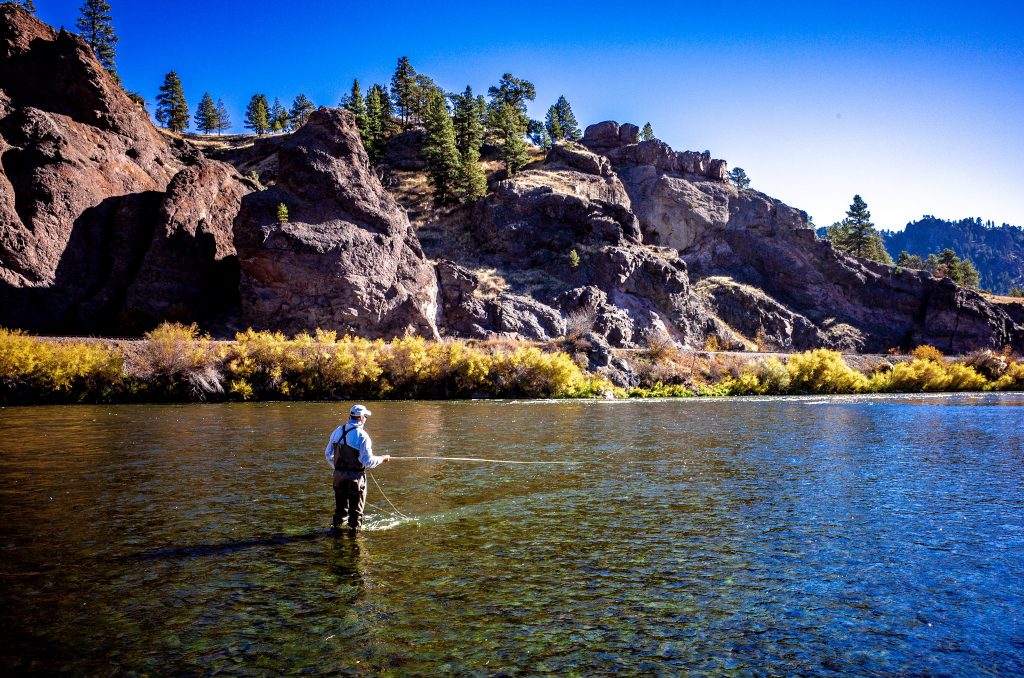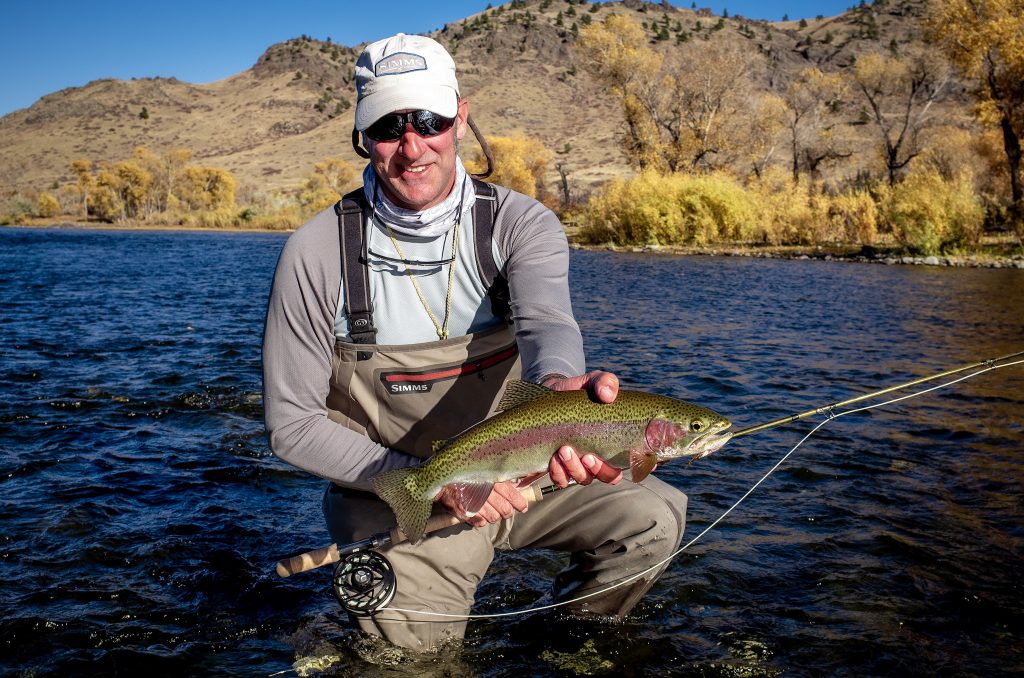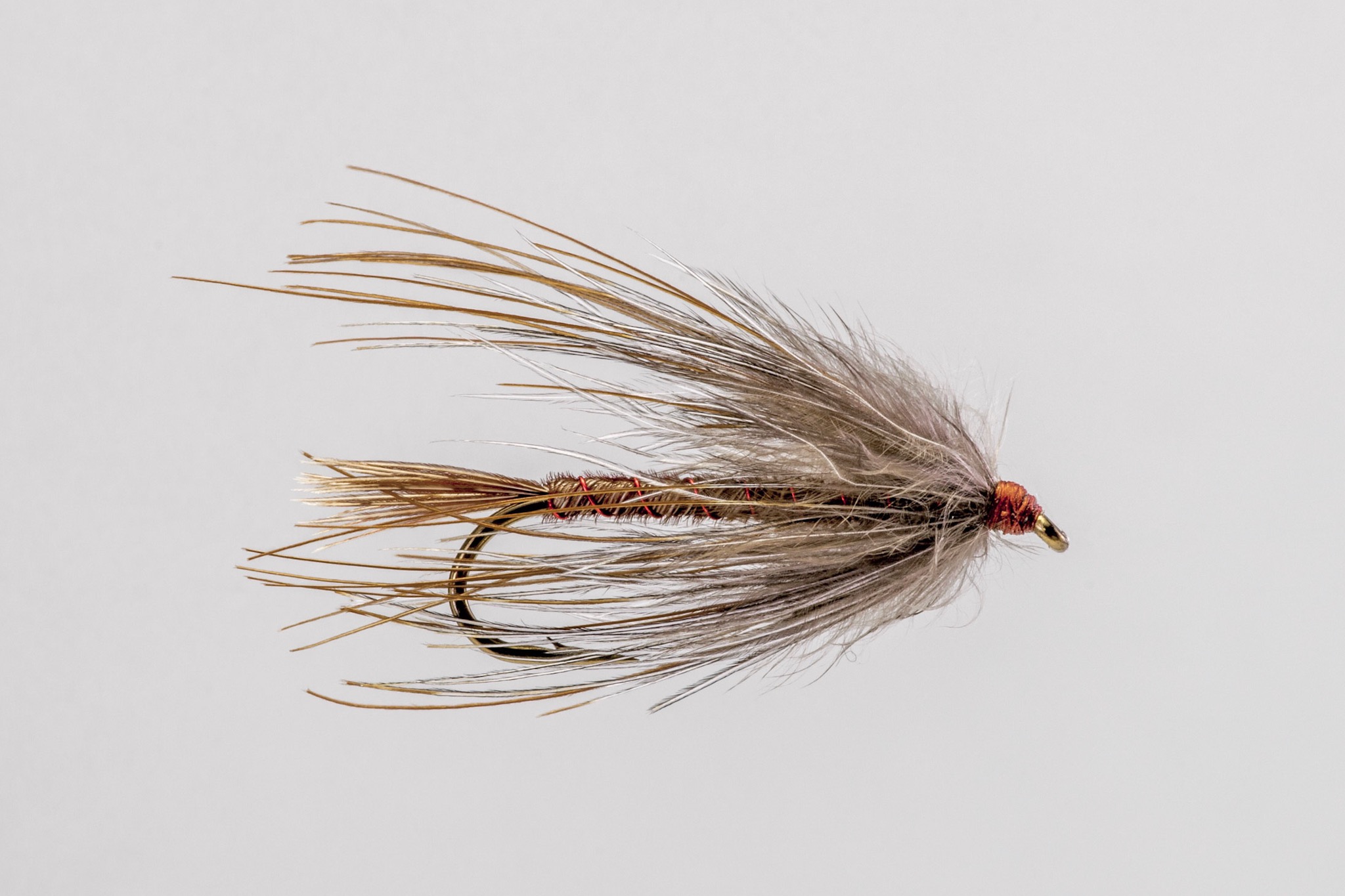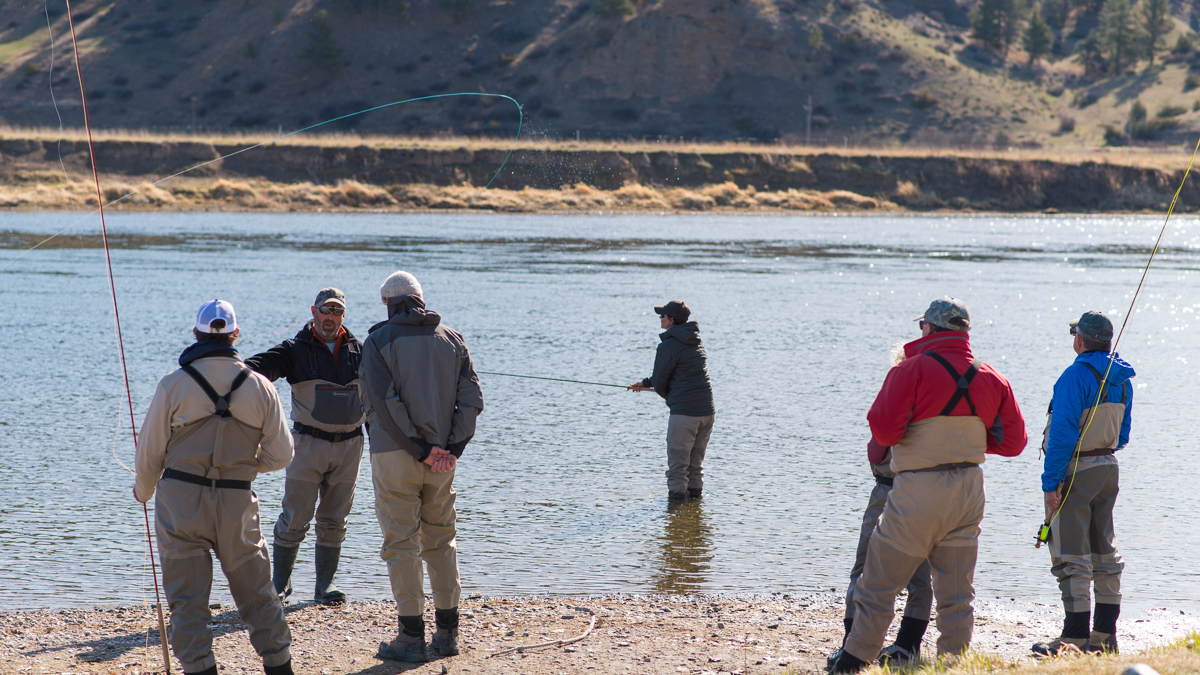Trout Spey Fishing Report for Late-October
We are in full “swing” on the Missouri River, and it’s easy to spot anglers exploring the Missouri River with their Trout Spey rods. Recent warm weather has hurt the fishing for both the single and two-handed crowd. “Inconsistent” would be the best word to describe our current fishing conditions, though many anglers would describe the weather as “fabulous”. Fishing reports vary between poor and very good, but not much great. Bottom line… we need some nasty weather expedite our transition to more autumn-like fishing conditions.
TEMPERATIURE AND FLOWS
Water temps are cooling but still on the warm side – low to mid 50’s – and the river is flowing at 4000cfs, which is higher than many will be accustomed to in late-October. The weeds are finally beginning to break up in large chunks, and spey fisherman will find certain banks are difficult to swing. Focusing your efforts on upwind and inside banks usually solves the weed issue.
WHERE TO FIND THEM
Our trout are scattered right now, and you’ll find fish in every kind of water imaginable. This is not a good thing, and makes identifying productive water difficult. In general, the faster the better, but I have found fish grouped up in certain slow drop-offs. Fishing the very fastest, deepest water is your best bet if you like to throw big flies like Stinger Sculpin’s, Lil’ Kim’s, or Intruder style flies. Broken shallow riffles are the best place to concentrate smaller soft-hackle presentations.
You can choose just about any section to float or wade fish, and you should have success. If you’re looking to toss big flashy stuff, I’d head towards Holter Dam, or fish/float through the Canyon. If smaller soft hackles are more your style, areas between Wolf Creek and the Dearborn should be on your mind. Pelican to Cascade has some great water, but it’s a long float to tackle. The days are getting shorter and stopping to swing the huge areas on the lower river burns up hours quickly.
HOW DEEP? WHAT LINE?
Because the fish are dispersed through the entire river, it’s difficult to promote any one rig. A Scandi head/line with an intermediate leader will cover many situations, especially if you’re throwing smaller soft-hackles or leeches. Bottom weed growth is still pretty thick – even in faster riffles – and a Scandi/intermediate setup keeps your fly above the forest.
For those heavy, faster and cleaner spots, I would suggest a Skagit head with at least a type III tip (RIO iMOW 5×5, SA Sonar S2 | S4), if not just going to a full type 6 or more T8 tip. If you find a spot where you can fish 10’ of T8, a big streamer and not hang the bottom or get weeded, you’re likely in a good big fish spot.

SWING PATTERNS
You have two choices here. Imitate what the fish are eating, or try and piss them off. If you’re the kind of angler who likes to imitate the food source, use flys that imitate Leeches, October Caddis, smaller mayflies (Pseudos/BWO) and caddis. I have tried most of the smaller (#14-16) soft hackles we carry in the shop and they all work. For the October Caddis we like a tan Sparrow, Carey Special or Red Squirrel (your own home-brew may work better). For Leeches our favorites are the Pig Pen or a Bouface Leech.
The biggest problem soft-hackle swingers will face is filtering through the enormous crop of juvenile fish in the river this year.
If you’re in the “piss them off” camp, bring everything. We haven’t seen a particular streamer pattern – or even color combo – that works that much better than another. Even when we think we have a streamer figured out, it changes the next day. Patterns I’ve done well on recently include Olive/White Stinger Sculpin, Montana Intruder, Kreelex (and variations), Thin Mint, Lil’ Kim, and Foxy Clousers. Fish these flies on the heaviest tip you can get away with.
Finding that heavy, deep clean water can be a bit of a trick. The best runs can be a mile apart or more on the river. HINT: Stand where you would normally start in a run, them walk back upstream a couple hundred feet and start there.
GEAR YOU SHOULD HAVE
A few things that I find myself appreciating every day right now:
FELT SOLED WADING BOOTS With the higher and warmer flows, I find myself wading in deeper, slicker and rocky spots. Felt makes wading much safer, and if you’ve ended around the Hady Creek Bridge area, you know what I’m talking about.
GOOD CHEST OR WAIST PACK A good well organized pack is essential when wading deep and switching tips and flies often. All things I’m doing right now. I prefer a sling or waist pack that I can put behind me when Spey casting. I’ve been wading up to my waterproof waist pack lately, as deep as I’ve regularly waded the Mo’.
A SELECTION OF SINK TIPS I normally only use an Intermediate sinking leader, but this fall I find myself using both floating (skating an October Caddis) and heavier sinking leaders as well. I would recommend carrying at least an intermediate and 3ips leader along with an intermediate. The Scientific Anglers Sonar leaders are my favorite, but the RIO Versi-leader is a good choice as well and has a few more size options.
Same goes for Skagit tips. I’ve changed Skagit tips more in the last 2 weeks than in the last 2 years. Every time I step out of the boat I check and make sure I have my tips in my pack. I would recommend a light tip (SA S1/S2, RIO iMow), especially if you don’t carry a Scandi rig with you. You’ll want it for swinging soft hackles. And on the other end of the spectrum, you’ll want that full sinking T8 tip for throwing big streamers.
LOOKING AHEAD
The current forecast shows a very gradual cool-down, and it looks to be a couple of weeks before we get nighttime lows consistently below freezing. I expect the fishing will improve slowly between now and mid-November, as the bugs disappear, the weeds die-off and the water cools into the mid-40’s. Our long range winter forecast is calling for a warm and dry winter, so we could be looking at an excellent winter for Trout Spey.




